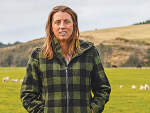THERE MUST be realistic expectations about what can be done to improve the environment, warns a local government leader.
Taranaki Regional Council’s director of environment quality Gary Bedford says public expectations, especially in large urban areas, are getting ahead of the science and a degree of realism needs to be taken.
Bedford says for many reasons, including some election slogans, it seems easy for people to think, ‘Yes we must have a clean environment where we can swim in the rivers every day and the sun will always shine and there will be no pollution’.
“But the reality is that those expectations come with a cost in the real world if you want to achieve them. They also require an understanding of processes in the real world and the techniques, methods, science and engineering that’s required to deliver these. Currently, we have the expectations running ahead of what can be delivered for a sensible cost.”
Bedford says policy development in New Zealand today appropriately allows for a great deal of public participation. But there is a downside: not everyone is fully informed and often the public don’t understand the implications of what they are demanding.
“So if you have councils developing policies based on what people want, that policy development or those expectations can run ahead of what the real world can deliver in science and engineering. So be careful about what you wish for, you may get it.”
In all this the internet is a “doubled edged sword”, Bedford says.
It’s very easy for a group to whip up a campaign on social media without getting the facts right.
“The ability to communicate more widely and more speedily is all good stuff, but also it means disinformation and poor information can be spread.”











